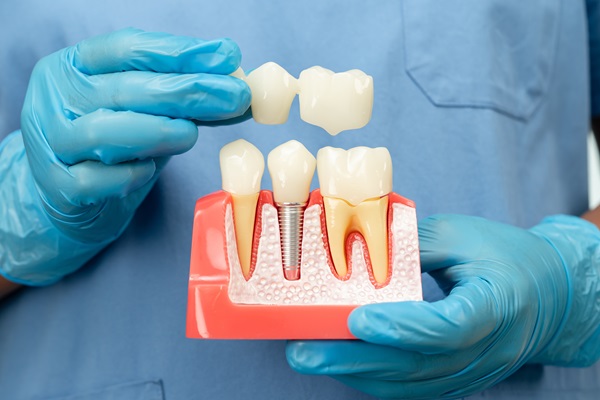Top Benefits of Getting Dental Implants From a Periodontist

Dental implants can seem daunting for those who are considering them as an option for replacing missing teeth. They are installed directly into the jawbone, making them a more invasive treatment than something like dentures, which simply sit inside the mouth. However, dental implants offer a wide range of benefits that other solutions do not, making them worth consideration for anyone who is missing at least one tooth.
If you are a good candidate for dental implants, be sure to consider the many advantages that this tooth replacement option can provide when making your choice. From longevity to restoration of natural function, there is a reason that many periodontists install implants as a regular part of their practices.
Why dental implants help oral health
To install a dental implant, a periodontist will make an incision into the gums in order to expose the jawbone. Then, they will install a metal rod into the bone, often by screwing it in. Once the bone heals around the post and integrates with it, the post can be used to support an artificial tooth. This method of tooth replacement comes with many advantages related to the fact that the tooth is anchored to the jaw.
Stimulates the jawbone
The jawbone is the strongest bone in the face and one of the hardest in the body. However, it achieves its health and density from the constant stimulation that it receives from the teeth. When a person chews, the pressure on the teeth transfers into the tooth roots, which stimulate the jawbone. When a person loses a tooth, they can experience a gradual atrophy (reduction) of jawbone density as a result.
A dental implant benefits oral health by anchoring into the jawbone, serving as replacement tooth roots. This ensures that the bone is stimulated and remains strong even after the original tooth has fallen out.
Stabilizes nearby teeth
The teeth work together as a unit, enabling a person to chew, grind, bite, and puncture their food. While the gums play a significant role in keeping teeth straight and strong, the nearby teeth also help. When a person is missing a tooth, the remaining teeth nearby might start to shift and move, impacting the bite and the person’s oral health.
A dental implant fills this gap with another functional tooth. As a result, the overall dentition can remain stable and healthy.
Restores the smile
Of course, most people pursue dental implants because they are self-conscious about the gap in their smile, and this is completely valid. Dental implants are made of materials that closely mimic the natural teeth, so they can be nearly indistinguishable from a person’s own dentition. This way, patients can enjoy a fully restored smile without the risk of someone spotting their prosthetic, as might happen with dentures.
Lasts longer than alternatives
The materials used to make a dental implant are crafted to last as long as possible. Unlike dentures, which are normally replaced every five to 10 years, the metal rod inserted into the jawbone will typically continue to function for the rest of the person’s life. Once the post has fused with the jawbone, patients can expect that this part of their treatment is likely to be permanently complete.
However, the artificial tooth affixed to the metal rod may need to be replaced from time to time. On average, a person might need a new crown for their implant every 15 to 20 years, but many patients see their implants function well beyond this window if they have good oral care. Replacing the tooth is a simple swap and does not require extensive drilling work like a crown on a natural tooth would.
Functions naturally
Since a dental implant is fused directly into the jawbone, it can handle the same stressors that the other teeth can. Unlike dentures, which can be unseated by certain foods or behaviors (such as talking), dental implants function naturally to help patients enjoy life the way that they want to.
Explore dental implants from a periodontist
Periodontists often install a dental implant because it is a highly effective method of tooth replacement. While it is true that the installation process is more invasive than alternatives like dentures, the result is something that can last for decades with good oral care. Contact our office to explore your dental implant options with our periodontist, and discover if you are a good candidate for implant placement.
Are you considering dental implants in the Cypress area? Get more information at https://www.charlesdyeriv.com.
Check out what others are saying about our dental services on Yelp: Dental Implants in Cypress, TX.
Related Posts
A periodontist may recommend a gum grafting treatment to patients whose oral health or appearance is affected by gum recession. Periodontists, or dentists who specialize in gum tissues, perform gum grafting operations regularly.Various factors can cause gum recession, including bacteria that cause gingivitis and recession, genetically thin tissue, orthodontic treatment, aggressive tooth brushing, smoking, tobacco…
Most people think that deep dental cleaning involves brushing and flossing their teeth every day. Some are probably putting whitening solutions on the teeth too. This is not what you call deep cleaning. A periodontist does the procedure because it involves cleaning below the gumline and down to your roots.But, how is deep dental cleaning…
If you’ve suffered from traumatic tooth loss, then you might be considering dental implants as a solution to restore your smile. However, many folks are concerned about how difficult getting implants installed is and the recovery time involved with the procedure. While dental surgery can seem scary, the technology used to install implants has come…
Bone grafting is a treatment for individuals whose jawbones have deteriorated or been damaged by injury, disease, or health conditions. Bone grafting restores the form and function of the jawbone. It essentially sets the stage for various dental procedures that are important for one’s oral health. A strong jawbone makes talking and chewing a lot…
